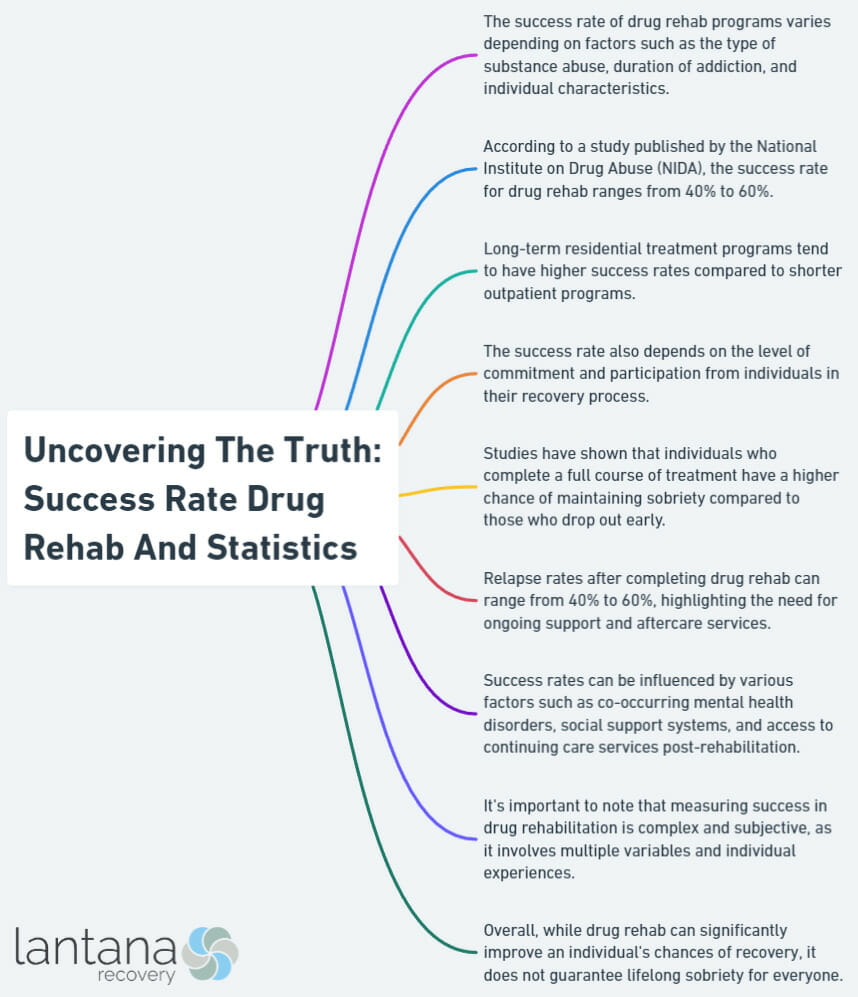Did you know that success in drug rehab is not just about sobriety, but also improving various aspects of life? With a staggering number of individuals who require drug rehab not receiving it, understanding the factors that contribute to success is crucial. In this blog post, we will uncover the truth behind the success rate of drug rehab, the role of mental health, and the various types of treatment programs available.
Short Summary
-
Customized treatments and ongoing support from multidisciplinary teams can lead to improved success rates in drug rehab programs.
-
Dual diagnosis treatment, cognitive-behavioral therapy, & creating an aftercare plan are strategies that can help individuals maintain long term recovery & prevent relapse.
-
Personalized treatment plans combined with resources and tools for aftercare create better outcomes for sustained sobriety.
Understanding Drug Rehab Success Rates
Drug rehab success is a complex issue, as it involves not only staying away from drug and alcohol addiction, but also seeing significant progress in different aspects of life. According to Treatment Episode Data Set (TEDS) by Substance Abuse and Mental Health Services Administration (SAMHSA), less than 42% of individuals who enter treatment for drug and alcohol use complete it or have the determination to see it through.
So, what factors can help ensure successful drug rehab outcomes? Customization, continual evaluations, and modifications delivered by medical professionals using evidence-based therapies and medications can all contribute to successful drug or alcohol addiction rehab outcomes.
The World Health Organization defines rehab as a process that empowers individuals to overcome their challenges and lead drug- and alcohol-free, healthy, and productive lives by providing them with a variety of interventions and support. Considering that one in four clients achieved and maintained sobriety in the first year after alcohol treatment, it’s essential to acknowledge the importance of various factors affecting success rates.

Measuring Success in Addiction Treatment
Success in addiction treatment is not a one-size-fits-all concept. It’s essential to consider various factors when measuring treatment effectiveness, such as patient progress tracking, relapse rates, and long-term recovery outcomes. A person receiving effective addiction treatment should demonstrate positive results, such as reduced substance use, improved mental health, and healthier relationships.
Most of the highly successful addiction recovery programs like our Charleston drug rehab involve:
-
Continuous progress tracking
-
Support Additionally, The Recovery Village offers:
-
Recovery meetings
-
Alumni groups
-
A patient portal These resources help individuals stay on track and realize their long-term goals.
Factors Affecting Success Rates
Success rates of addiction rehab programs can be influenced by a range of factors, including the type and intensity of treatment, individual commitment to recovery, presence of co-occurring mental health disorders, social support systems, and post-treatment follow-up and support.
For example, inpatient and residential treatment for drug addiction usually have a higher recovery rate than outpatient drug-free treatment programs. “Residential programs reported a 65% completion rate compared to 52% for outpatient settings.” (Residential and outpatient treatment completion for substance use disorders in the U.S.: Moderation analysis by demographics and drug of choice, Stahler at al. 2016)
Length of treatment plays a critical role in determining success rates, with the National Institute on Drug Abuse encouraging at least 90 days of treatment for a successful recovery. Intensive therapy and counseling combined with medication-assisted treatment (MAT) for specific addictions can lead to higher success rates and long-term sobriety in substance abuse treatment programs.
Types of Drug Rehab Programs and Their Success Rates

There are several highly effective drug and alcohol treatment programs available in the United States, each with its success rates and benefits. The National Institute on Drug Abuse recommends a minimum treatment duration of 90 days for successful recovery, emphasizing the importance of comprehensive care and support.
Treatment beyond detox is essential because it not only addresses the physical symptoms of substance use but also the psychological and emotional factors that led to the use in the first place. Let’s explore different types of drug rehab programs and their success rates in more detail.
Inpatient Rehab
Inpatient rehab programs provide intensive, 24-hour care and support to help individuals overcome addiction. The success rate of inpatient rehab programs varies depending on the type of program and the substance being treated. For example, standard rehabilitation programs for cocaine addiction have a 50% success rate after two years of completion, suggests James R. McKay in his research Factors in Sustained Recovery from Cocaine Dependence, published in Journal of Substance Abuse Treatment.
Intensive care and longer treatment durations are essential for successful recovery from addiction, as they give the patient more time and environment to acquire new coping skills and form healthier habits. In the case of cocaine addiction, long-term residential treatment (90 days or more) has been shown to result in better one-year outcomes than those who did not stay in treatment for that duration.
Inpatient programs have also been found to be the most successful in treating patients with co-occurring mental illnesses, as these programs can provide comprehensive care addressing both addiction and mental health issues.
Outpatient Rehab
Outpatient drug rehab programs, including intensive outpatient treatment, offer a balance of flexibility and freedom compared to inpatient and residential programs. These programs typically meet for 10 hours per week during the day or at night, enabling individuals to maintain their work, school, and family life while still receiving addiction treatment.
Outpatient treatment success rates vary depending on the substance being treated and the intensity of dependence on the substance. With the right motivation and commitment, individuals with stimulant addiction can achieve successful recovery through outpatient rehab programs.
The components of an effective outpatient rehab program include various therapies, such as contingency management, motivational enhancement, and cognitive-behavioral therapy. These can provide individuals with the tools to successfully manage their addiction, as well as address any co-occurring mental health issues that may be contributing to their substance use.
Medication-Assisted Treatment (MAT)
Medication-assisted treatment (MAT) can be a powerful tool to reduce cravings and lower relapse risk for certain addictions. Research by Gail D’Onofrio, MD, a Yale Medicine primary care and addiction medicine specialist demonstrated that patients taking medication-assisted treatment (MAT) for opioid abuse have significantly lower relapse rates than those on tapering.
This suggests that longer treatment plans provide greater addiction support benefits. MAT has proven to greatly benefit individuals struggling with opioid use disorder. As most of the medicines used in medical detox help counter the withdrawal symptoms during the initial stages of the treatment.
When combined with supportive behavioral therapy and counseling at drug rehab, it can be an indispensable resource in recovery. By addressing both physical and mental aspects of addiction, MAT can significantly improve drug rehab success rates.
The Role of Mental Health in Drug Rehab Success

Mental health plays a crucial role in drug rehab success, as it can empower individuals to stay motivated and effectively manage the challenges of recovery. Addressing mental health and substance abuse issues through dual diagnosis treatment can help prevent individuals from using substances to self-medicate and address mental health issues caused by substance abuse.
By integrating mental health treatment with addiction treatment, individuals can achieve better outcomes and a higher likelihood of long-term sobriety. Let’s delve deeper into the importance of dual diagnosis treatment and the various therapy approaches utilized in addiction treatment.
Dual Diagnosis Treatment
Dual diagnosis treatment is a form of treatment that focuses on addressing both substance abuse and mental health conditions. For example, individuals with cocaine addiction who receive adequate counseling time devoted to both addiction and mental health concerns in a standard rehabilitation program have been found to achieve better outcomes.
A recent study published in BMC Psychiatry, 2021 estimated that 75% of people with a mental illness also struggle with substance abuse disorder, highlighting the importance of integrated dual diagnosis treatment. By addressing the root causes of addiction and providing comprehensive care, dual diagnosis treatment can significantly improve drug rehab success rates.
Therapy Approaches
Various evidence-based therapy approaches have proven to be successful in addiction treatment, such as:
-
Cognitive-behavioral therapy: helps individuals recognize and adjust unhealthy thought patterns and behaviors that contribute to addiction while equipping them with the skills to manage cravings and triggers effectively.
-
Motivational interviewing: focuses on helping individuals find their own motivation and commitment to change their addictive behaviors.
-
Family therapy: involves the participation of family members in the treatment process to address family dynamics and support the individual’s recovery.
Motivational interviewing encourages individuals to explore and overcome any doubts about making changes in their behavior and create a plan to reach their desired goals.
Family therapy offers a unique opportunity to:
-
Understand the influence of addiction on relationships
-
Learn how to communicate and interact in healthier ways
-
Provide better support for their loved one in recovery
Relapse and Its Impact on Success Rates

Relapse is a common occurrence in addiction recovery. However, it’s important to recognize that relapse does not mean that treatment has failed. It simply means that the individual needs to reach out to their physician or other healthcare provider to get back on track, adjust their treatment plan, or explore other rehabilitation options.
Understanding the nature of relapse and its impact on success rates can provide a more realistic perspective on the recovery journey. By comparing relapse rates for addiction to other chronic diseases and exploring strategies to prevent relapse, we can gain a deeper understanding of the challenges and successes in addiction treatment.
Comparing Relapse Rates

Relapse rates for addiction are comparable to those of other chronic diseases, like diabetes and hypertension. This comparison helps to illustrate the complexity of addiction and the ongoing nature of the recovery process. For example, relapse rate for substance abuse is 40-60%, while the relapse rate for hypertension and asthma is 50-70%, according to a study published in Journal of the American Medical Association (JAMA) .
Recognizing the similarities in relapse rates between addiction and other chronic diseases can be encouraging for those struggling with addiction. It highlights the importance of ongoing treatment and support systems in managing addiction as a chronic disease.
Strategies to Prevent Relapse
Preventing relapse is a crucial aspect of maintaining long-term recovery and sobriety. Strategies to stay on track and prevent relapse include:
-
Recognizing early warning signs
-
Developing coping skills
-
Implementing relapse prevention skills
-
Seeking treatment and support
-
Avoiding triggers
-
Managing stress
-
Finding healthy ways to cope with cravings
Aftercare planning is another essential strategy for preventing relapse. Creating a plan for continuing care after the initial treatment program ends can help individuals maintain long-term recovery and prevent relapse. Incorporating support networks, such as family, friends, and professionals, into the recovery journey can further enhance success rates and maintain lasting sobriety.
Enhancing Drug Rehab Success Rates

Improving drug rehab success rates can be achieved through various strategies, including personalized treatment plans, working with multidisciplinary teams, and having ongoing support. Customizing treatment plans, continually evaluating progress, and making necessary modifications ensures more effective treatment and improved results. Additionally, multidisciplinary staff can provide both physical and mental treatment, which is crucial for successful recovery.
A lack of aftercare has been identified as a contributing factor to the low success rates of drug and alcohol rehabs. By focusing on aftercare planning and ongoing support, individuals can maintain long-term recovery and prevent relapse, ultimately increasing drug rehab success rates.
If you are skeptical of the efficacy of rehab facilities, read our article about whether drug rehab work or not for more infromation.
Personalized Treatment Plans
Personalized treatment plans can be incredibly beneficial to patients, as they are tailored to each individual’s specific needs, circumstances, and objectives. By combining:
-
Medication
-
Therapy
-
Lifestyle changes
-
Other interventions
Personalized treatment plans can lead to the best possible outcome for each patient.
Assessing the patient’s needs, setting realistic goals, and monitoring progress are all effective strategies for creating personalized treatment plans that will motivate the patient. Additionally, integrating mental health treatment into addiction treatment can help uncover the root causes of addiction and provide more comprehensive care, leading to higher success rates.
Multidisciplinary Teams
Multidisciplinary teams, consisting of diverse professionals such as therapists, physicians, and counselors, play a vital role in providing high-quality addiction treatment and improving success rates. These teams work together to address both the physical and mental aspects of addiction, ensuring a comprehensive and effective treatment plan for each patient.
By collaborating and sharing their expertise, multidisciplinary teams can offer a well-rounded approach to addiction treatment, ultimately leading to improved outcomes and increased success rates. This comprehensive care is essential for individuals seeking long-term recovery and lasting sobriety.
For more information, read our article on what is rehab like for drug addiction treatment.
Aftercare and Ongoing Support

Aftercare and ongoing support can make a significant difference in maintaining long-term recovery and preventing relapse. By providing individuals with resources, tools, and support systems, aftercare programs can help them stay on track with their recovery goals and navigate the challenges of life after rehab. Alumni programs, support groups, and continued therapy are just a few examples of aftercare services that can contribute to increased drug rehab success rates.
By prioritizing aftercare and ongoing support, individuals can achieve long-term sobriety and live fulfilling, drug-free lives.
Summary
In conclusion, drug rehab success rates can be influenced by various factors, including the type of treatment program, mental health, and aftercare support. By understanding these factors and implementing personalized treatment plans, multidisciplinary teams, and comprehensive aftercare, individuals can greatly improve their chances of achieving long-term sobriety and living fulfilling lives free from addiction.
Frequently Asked Questions
What is the failure rate of rehab?
Unfortunately, the failure rate of rehab is high, with only 42% of individuals completing treatment. Factors like frequency, duration, and type of drug used have an effect on an individual’s success in treatment.
What are the odds of staying sober?
With the right support, 89% of those completing alcohol treatment remain sober in the first month after rehab.
68% have successful outcomes when detox is a part of treatment. Therefore, staying sober is an achievable goal.
What is the most successful treatment for addiction?
Behavioral therapy combined with medication is the most successful treatment for addiction, especially when treating opioid addictions. Cognitive Behavior Therapy, Contingency Management, 12-Step Facilitation, Treatment with medication, and Self Help Groups are also commonly used and successful treatments.
Is it ever too late for rehab?
It’s never too late to seek treatment for a substance use disorder and start your journey to recovery. Don’t let age or other barriers prevent you from getting the help you need.
What factors can help ensure successful drug rehab outcomes?
Customization, continual evaluations and modifications by medical professionals utilizing evidence-based therapies and medications can greatly increase the success rate of drug rehab programs.
These modifications can include changes to the program structure, the types of therapies offered, and the medications prescribed. Such changes can help to ensure that the program is tailored to the individual needs of the patient, and that the patient is satisfied.









